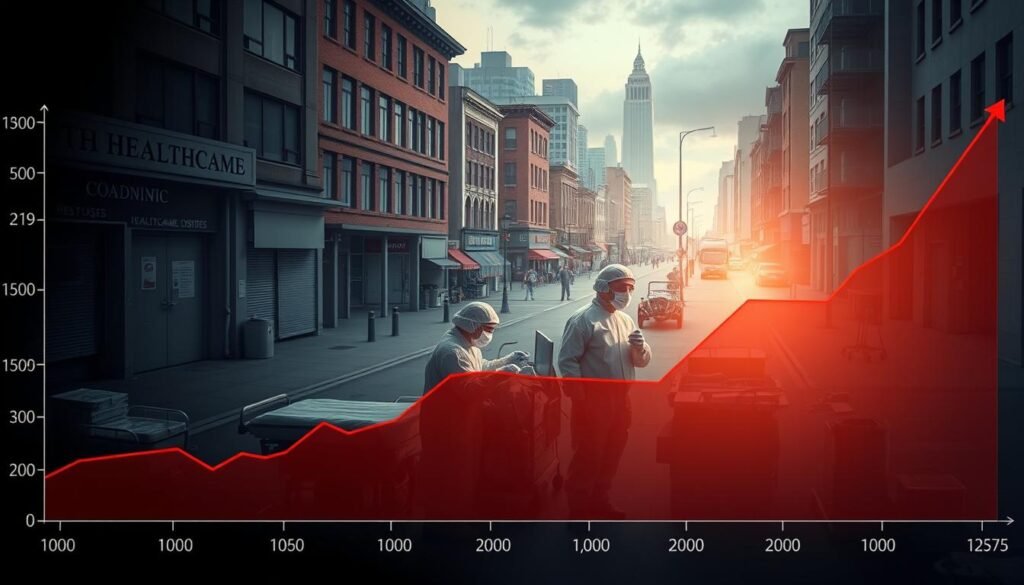Did you know that the latest COVID-19 variants update reveals over 30 variants identified by early 2023, each posing new challenges to global health systems? In this article, we’ll explore the changing virus and its big impacts.
It’s key to know about these variants. They help shape our health plans and improve how we fight this crisis. By keeping up with the latest, we help make a safer, healthier world for everyone.
Overview of the COVID-19 Variants Update
Understanding COVID-19 variants is key to fighting the pandemic. SARS-CoV-2 has mutated, leading to many variants. These changes affect how easily the virus spreads and how well vaccines work.
There are different types of variants, each with its own level of risk. The World Health Organization (WHO) and the Centers for Disease Control and Prevention (CDC) classify them. This helps us know which ones are most dangerous.
Classification in the Latest COVID-19 Variants Update
The WHO and CDC divide COVID-19 variants into three groups:
- Variants of Concern (VOC): These are more contagious or affect treatment and vaccine success.
- Variants of Interest (VOI): These might spread more or be more harmful, but their threat is not yet clear.
- Variants Under Monitoring (VUM): These are being watched because of their mutations. They might become more serious in the future.
Why Monitoring COVID-19 Variants Update Is Crucial
It’s vital to keep an eye on COVID-19 variants. Updates on these changes help health experts plan better. Without constant monitoring, the virus could spread too much, harming those most at risk.
Knowing how variants evolve guides vaccine and control efforts. This knowledge is essential for fighting the pandemic effectively.
Recent Developments in COVID-19 Variants
The COVID-19 variants have changed a lot in 2023. New Omicron subvariants have appeared, and it’s important to know about them. Their ability to spread shows how the pandemic is evolving and how we need to respond.
Key Findings from the 2023 COVID-19 Variants Update
Some variants are spreading differently than before. Knowing about these helps health experts keep a close eye on them. In 2023, we’ve seen:
- Omicron subvariant BA.4
- Omicron subvariant BA.5
- XBB.1.5
These variants have changes that might make them spread more or avoid our immune system. The study of COVID-19 variants is ongoing, showing the need for constant research.
Impact of Variants on Transmission Rates
The spread of new variants has raised many concerns. Research shows some variants spread more than others. For example:
| Variant | Transmission Rate Compared to Previous Variants |
|---|---|
| Omicron BA.4 | 30% higher |
| Omicron BA.5 | 50% higher |
| XBB.1.5 | 20% higher |
This information stresses the need for us to update our health plans and vaccines. Staying flexible is key as we face these new challenges.
Variant Impact on Vaccine Efficacy
New COVID-19 variants are a big challenge for public health. They affect how well vaccines work. It’s key to understand how vaccines handle these changes to keep communities safe.
Vaccines are a big help against COVID-19. But, they need to keep up with the virus’s changes.
How Vaccines Respond to New Variants
Vaccines from Pfizer-BioNTech and Moderna work differently against various variants. Some mutations can dodge the immune system’s response. This shows why we need to keep studying how vaccines fight new variants.
It’s important to watch how vaccines do against these new strains. This helps us adjust our health plans.
Importance of Updating Vaccination Protocols
The fast-changing nature of COVID-19 variants means we need to update our vaccine plans. Health experts must check how new strains affect vaccine strength. This might mean creating booster shots for specific variants.
Following new vaccine guidelines is also key. It helps keep everyone safe and fights against the virus spreading.
| Vaccine Type | Effectiveness against Variants | Need for Booster |
|---|---|---|
| mRNA Vaccines (e.g., Pfizer-BioNTech, Moderna) | Reduced efficacy against certain variants, notable Delta and Omicron | Recommended for variants to bolster the immune response |
| Vector-Based Vaccines (e.g., Johnson & Johnson) | Moderate effectiveness, more significant adaptation needed | Under evaluation for variant modification |
| Inactivated Virus Vaccines (e.g., Sinovac) | Stable for some variants but lower efficacy against others | Booster initiatives in progress based on variant prevalence |
Global Health Response to Variants
As COVID-19 variants evolve, a strong global response is key. Health teams around the world are using various strategies to keep up. They focus on tracking and responding to new variants. This is vital for understanding how the virus spreads and shaping health policies.
Strategies for Variant Surveillance
Genomic sequencing is a major tool in this fight. It helps identify specific variants in different areas. This way, we can track changes in the virus over time.
Genomic analysis gives us important data. It helps us make quick decisions, like updating vaccines or changing public health messages.
International Collaboration and Data Sharing
Working together is essential in fighting COVID-19 variants. Platforms like GISAID help share viral data. This makes it easier for everyone to understand the variants faster.
This teamwork not only makes health efforts more effective. It also brings countries together in facing these challenges.

Regional Focus: India’s Response to Variants
India is facing both challenges and opportunities with COVID-19 variants. The country is closely watching and acting fast to manage the situation. This look into the current COVID-19 situation in India and the steps taken to fight variants is important.
Current COVID-19 Situation in India
India has seen ups and downs in COVID-19 cases, with some spikes due to new variants. Keeping up with testing and reporting is key. Health officials stress following COVID-19 health guidelines to lower the risk of spreading the virus.
Measures Implemented to Control Variants
India has a plan to fight variants:
- Improved testing in different states.
- Lockdowns in areas with high cases.
- Efforts to get more people vaccinated and follow health rules.
- Working with global health groups to share data on variants.
These steps show India’s dedication to public health and safety. By working together, the country hopes to overcome current challenges and build a stronger future.
| Measure | Description | Impact |
|---|---|---|
| Enhanced Testing | Testing is now easier to get in both cities and towns. | Finds cases quickly to stop the spread. |
| Localized Lockdowns | Short-term rules in places with more cases. | Helps control the virus in those areas. |
| Aware Campaigns | Public efforts to teach about vaccines and health rules. | Makes people more likely to follow health guidelines. |
| International Collaboration | Sharing data on variants with global health groups. | Improves understanding and how to respond. |
Public Health Guidelines Amidst Variants
New variants of COVID-19 keep coming, making it key to follow good health guidelines. These guidelines help keep us and our communities safe. By sticking to them, we help create a safer space for everyone.
Recommendations for Individuals
Here are some tips for staying safe:
- Keep up with the latest COVID-19 health tips from trusted sources like the CDC and WHO.
- Make sure your vaccinations and boosters are current. They help protect you from serious illness caused by new variants.
- Wash your hands often and use hand sanitizers to stay clean.
- Try to avoid places that are too crowded or risky for catching the virus.
Importance of Mask-Wearing and Social Distancing
Masks and keeping a safe distance are key to stopping the virus. Wear masks in crowded, indoor areas with bad air. Keeping at least six feet away from others helps stop the virus from spreading. These steps help keep us all healthy and safe.

Diagnosing COVID-19 Variants
Understanding COVID-19 variants is key to managing public health. We use different tests to quickly spot these strains. With better tools, we can see how they affect our communities.
Testing Methods for Identifying Variants
PCR tests and rapid antigen tests are main tools for finding COVID-19 variants. Each has its own strengths:
- PCR Tests: These tests are very good at finding the virus’s genetic material. They can spot variants by looking at specific changes in the sample.
- Rapid Antigen Tests: Less accurate than PCR tests, they give fast results. They’re great for quick checks, like in outbreaks where fast action is needed.
The Role of Genomic Sequencing
Genomic sequencing is a new way to diagnose COVID-19 variants. It lets us look at the virus’s full genetic makeup. This shows us its mutations and how it has changed. It helps us understand how widespread and new variants are.
- It lets us track variant spread in real-time.
- It helps us see if vaccines work against new strains.
- It guides public health actions by showing how variants spread and behave.
The Role of Mutations in Variants
Understanding coronavirus mutations is key to knowing about new variants. The virus’s genetic changes help it adapt. This affects how we fight the virus and protect public health.
What Causes Variants to Emerge?
Variants of SARS-CoV-2, the COVID-19 virus, come from several reasons. Mainly, these are:
- Replication errors during viral reproduction
- Selective pressure from immunity due to vaccination or previous infections
- Environmental factors that may enhance viral survival and spread
When the virus changes in human hosts, it can become more contagious or deadly. This leads to many different variants.
Potential Future Mutations to Watch For
Staying alert to future coronavirus mutations is vital. Some mutations to watch include:
- Changes in the spike protein, which can affect vaccine efficacy and immune escape
- Alterations in the receptor-binding domain that enhance binding to human cells
- Mutations that increase resistance to monoclonal antibody treatments
Keeping an eye on these mutations helps us update our fight against the virus. This ensures our treatments stay effective.

| Mutation Type | Potential Impact | Current Monitoring Status |
|---|---|---|
| Spike Protein Changes | Enhanced transmissibility | Ongoing genomic surveillance |
| Receptor-Binding Domain Alterations | Increased binding affinity | Regular assessment in laboratories |
| Resistance to Therapeutics | Reduced treatment efficacy | Continual research and updates |
Addressing Misinformation about Variants
It’s key to fight misinformation about COVID-19 variants. The virus changes fast, leading to many wrong ideas. We need to share true facts to keep everyone informed. Social media often spreads false news, making things confusing.
Common Misconceptions and Facts
Many people don’t understand COVID-19 variants well. Here are some wrong ideas and the right answers:
| Misconception | Fact |
|---|---|
| Variants are a sign that vaccines do not work. | Vaccines are good against serious illness and hospital stays, even with new variants. |
| All variants are more dangerous. | Some variants spread easier but don’t always cause worse sickness. |
| Natural immunity is sufficient protection. | Vaccines give better protection against many variants than just getting sick. |
The Role of Social Media in Spreading Information
Social media can shape what people think about COVID-19 variants. Many check these sites for news. It’s important to share correct info carefully. We should think critically and check sources before posting to stop false info.
Economic Impact of COVID-19 Variants
COVID-19 variants have brought big challenges to the world’s economies. Looking at how these variants affect global supply chains and healthcare spending helps us understand their role. This knowledge is key to managing the pandemic and planning for recovery.
Effects on Global Supply Chains
Global supply chains have faced big problems because of COVID-19 variants. These issues include:
- Increased border restrictions and trade barriers
- Labor shortages in manufacturing and logistics
- Fluctuating demand for goods and services
These problems have caused delays, leading to higher costs and unpredictable supplies. Companies need to find new ways to source locally and improve how they manage their stock. This helps them deal with the risks from these variants.
Impact on Healthcare Spending
The fight against COVID-19 variants has made healthcare spending go up. This rise is due to:
- Vaccination drives and booster campaigns
- Enhanced healthcare infrastructure and resources
- Continued research and development on treatments and vaccines
In India, the strain on healthcare shows the need for smart investments in healthcare. It’s vital to manage this economic impact well. This ensures healthcare systems can handle future variants.

Future Outlook for COVID-19 Variants
The future of COVID-19 variants looks complex and ever-changing. Experts predict new variants will keep appearing, thanks to global connections and how we live. To fight these variants, strong global health plans are key. Health groups stress the need to stay quick to adapt to new data and vaccine success.
Predictions for Next Year
Several things will influence COVID-19’s path next year. Here’s what we expect:
- More watching and quick checks on new variants around the world.
- Improved vaccines that can tackle specific changes in future variants.
- Changes in how we talk about health as fake news affects vaccine use.
Long-term Strategies for Global Health
Dealing with future COVID-19 variants requires long-term global health plans. These include:
- More money for research on new vaccines and how to get them out.
- Stronger teamwork worldwide to make sure everyone has access to vaccines.
- Education programs to help people understand COVID-19 and its variants better.
By being flexible in these plans, we can better fight outbreaks and build a healthier world.
The Path Forward
As we wrap up this detailed look at COVID-19 variants, it’s key to stress the need for ongoing caution. New variants remind us that our battle against the virus is never-ending. By keeping an eye on these changes, we can react quickly and adjust our plans as needed.
Public cooperation is vital. Following health advice and joining community efforts helps build a strong defense. Together, we can face the challenges of this health crisis. Our unity is essential as we work to lessen the effects of COVID-19 variants.
Success in fighting COVID-19 depends on our teamwork and trust in each other. Through continued cooperation, we can create a safer future. Let’s stay alert and look out for one another as we move forward.




